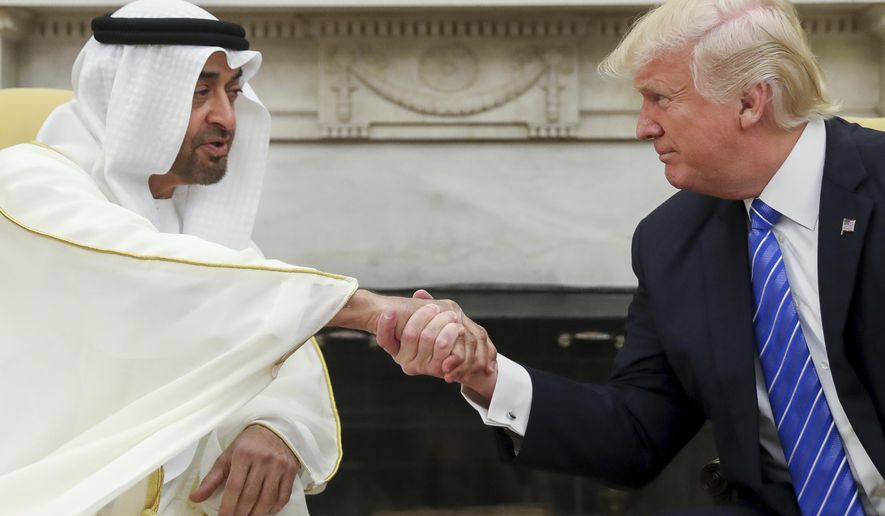President Trump’s plan to gather Arab Gulf leaders in Washington for an October summit to create a military alliance against Iran has stirred optimism, curiosity and outrage on the world stage of opinion this week.
Informally dubbed “Arab NATO,” the recently discussed alliance is a Saudi-led effort to counter Iran by coordinating missile defenses, military training and counter-terrorism measures — and would include the six Arab Gulf states in addition to Egypt and Jordan. The Washington summit is tentatively set for Oct. 12-13.
The United Arab Emirates’ lead English-language paper, The Gulf News, firmly supported the effort in an editorial: “’Arab Nato’ can counter Iran more effectively”.
“Iran has its fingers in several Middle East pies,” the editorial states. “It relies on well-armed and trained proxy non-state actors, and branches of its own security apparatus to spread sectarian discord.”
The Gulf News goes on to applaud the Trump administration’s “hardline stance” on terrorism and withdrawing from the 2015 nuclear deal, which it says has “alarmed Iran.” Creating a NATO-like regional alliance “would be another step in this direction” it concludes.
The Jordan Times took another angle, taking aim at Israel instead of Iran in an editorial headlined: “Arab NATO in perspective.”
“Without belittling the Iranian expansionist moves in the region and its destabilizing policies and practices,” it states, “one wonders whether an Arab-based military alliance should be one-track minded and concentrate only on Iran, when there are many other enemies to the Arab order, on the top which is, of course, Israel.”
The editorial adds that until there is an “honorable, peaceful resolution for the Palestinian-Israeli conflict, Arabs everywhere will continue to view Israel as enemy number one and not Iran.”
Bloomberg opinion contributes to the debate with: “Creating an ’Arab Nato’? Here’s a Better Idea for Trump,” which argues that the alliance should also include Turkey and NATO.
Bloomberg writers note it would probably be “too much to ask that Israel be invited, although it will carry a large share of the burden in containing Iran’s regional ambitions.”
They also urge the Trump administration to more firmly engage to end the embargo Saudi Arabia, the U.A.E., Egypt and Bahrain have imposed on Qatar, which “has greatly benefited Iran by deflecting Arab energies and deepening the bond between Doha and Tehran.”
The Hong Kong-based English-language Asia Times addressed the issue on Friday with an opinion “An ’Arab NATO’ and America’s militarized Mideast policy” by Christina Lin, a former SAIS-Johns Hopkins University Fellow at the Center for Transatlantic Relations.
Ms. Lin argues that the “Trump administration’s quiet push for a Saudi-led Arab NATO” is actually a militarized anti-Iranian alliance that “risks plummeting the Middle East into further chaos.”
“While the US military-industrial complex and its Arab client states would profit from this venture to attack Iran,” she writes, “it would inflict further harm on European stability in the form of a new wave of refugees, as well as threaten Asian economy and security.”
Ms. Lin contends that Asian countries do not share the “oft-repeated US mantra that Iran is the largest state sponsor of terrorism” but instead view Saudi Wahhabi fanaticism as “the root cause of terrorism in Asia.”
“As such, the notion of the U.S. backing Riyadh, which has spent $100 billion exporting Wahhabism, and helping to build a more militarily capable Saudi Wahhabi-led alliance, would likely be disconcerting for countries in Europe and Asia,” she writes.
• Dan Boylan can be reached at dboylan@washingtontimes.com.




Please read our comment policy before commenting.